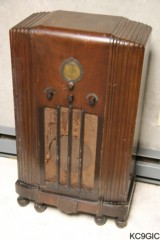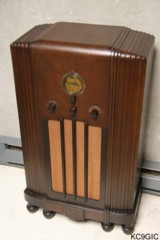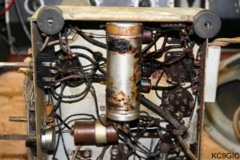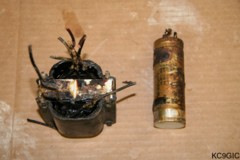

"Before" "After"
Brand: Crosley Year of Manufacture: 1935 Frequency Range(s): 550 - 1600 Kc, 1.7 - 4.5 Mc, 6 - 15Mc
Tube Lineup: 80 Rectifier, 42 Output, 76 Detector, 76 1st A.F. Amp, 6B7 I.F. Amp/AVC, 6A7 Osc/Mod, 6D6 R.F. Amp
Schematic: Available here, courtesy of Nostalgia Air. Riders 6-22
Tube Lineup: 80 Rectifier, 42 Output, 76 Detector, 76 1st A.F. Amp, 6B7 I.F. Amp/AVC, 6A7 Osc/Mod, 6D6 R.F. Amp
Schematic: Available here, courtesy of Nostalgia Air. Riders 6-22
I always seem to find myself faced with a never ending problem, and I'm sure that other collectors can relate. No free room to store my junk! One rainy Thursday night in November 2006, my free time between work and class was being spent as usual, browsing the stores and markets. This one was found at a large indoor flea market, the same market where I have purchased several radios lately. An initial examination showed that this radio was quite restorable, and the original finish was in excellent shape. The price was decent, at $59.00, but due to the whole lack of free space thing, it had to be passed up.
Several weeks later I returned to the mall, hoping that this radio had sold so I wouldn't have to buy it. Sure enough, it was still sitting right where I last saw it, so it was packed into my truck for the drive home. Condition wise, one knob was incorrect, the grille cloth was trashed, but the original finish was restorable. The chassis looked decent, until it was removed from the cabinet. The entire bottom of the chassis was coated with the black tar like substance from the power transformer, and the primary windings were open. Below center: Black wax like tar, from a burnt up power transformer.
Electronic Restoration
Before any work was preformed on the chassis, a new power transformer had to be obtained. When inquiring about a replacement, several factors had to be determined. A minimum rating was calculated using a RCA Tube Manual. The transformer on this radio is mounted next to the tuning capacitor, and close to some tubes so overall dimensions were critical. A replacement was located at Play Things of Past. With the new transformer on hand, next came a thorough cleaning to remove the black tar from the top and bottom of the chassis. Below center: The bad power transformer, and one of the shorted electrolytic capacitors.
Since the replacement transformer was larger than the original, new bolt holes had to be drilled. Once everything was mounted, an electronic overhaul could begin. In my restorations, the original capacitors are almost always re-stuffed to retain the original appearance. This radio had been worked on so many times during it's lifetime, that very few, if any original capacitors were still present. Without having to take to time to re-stuff, the repairs went rather fast on this one. A new cloth cover cord was installed, along with an in line fuse to for protection.
The first power up seemed to go good. Amperage draw was ok, and the radio was playing with a few minor problems. An alignment was preformed using the procedure on the schematic. The final repair was a thorough cleaning on the band switch and volume control. It was later determine that the power transformer had been cooked due to a shorted electrolytic capacitor. A good reason NEVER to plug in a radio until it has been properly serviced.
Cosmetic Restoration
The cabinet only required a few minor repairs to have it looking good enough for display. Since the original finish was mostly intact, it would be touched up and preserved. The cabinet was washed using mineral spirits and a scrubbing pad. This removed the dirt and and loose or flaking lacquer. To blend in the many scratches and discolored areas, the whole cabinet was wiped down with a dark colored stain, "Special Walnut" color was used. With the excess stain wiped off, the cabinet was ready for a new coat of lacquer. A few coats of Def brand clear lacquer were applied to seal in the original finish.
A new grille cloth was purchased from Radio Daze. Patter GRC 12 was used. The missing knob was purchased from Mike Koste from Gobs of Knobs.
This radio was sold in March 2008 due to collection downsizing efforts.

